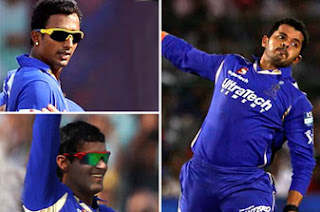
Players paid Rs 40-60 lakh to spot-fix: Delhi Police
The Delhi police moved to arrest S Sreesanth, Ajit Chandila and Ankeet Chavan for alleged spot-fixing in the Pepsi IPL 2013 with evidence collected from three matches. Neeraj Kumar, the Delhi Police commissioner, said Rajasthan Royals’ matches against Pune Warriors India on May 5, against Kings XI Punjab on May 9 and against Mumbai Indians on May 15 were the tainted ones. In each game, one player adhered to pre-arranged agreements with bookies to concede a set number of runs, according to the Delhi Police.
The amounts paid to the players, for conceding a set of minimum runs in an over, ranged from Rs 40 lakh to Rs 60 lakh, police said.
“In this match, Chandila gave 14 runs in the second over of his spell,” said Kumar, referring to the Rajasthan-Pune match. “However, he (Chandila) forgot to give the predetermined signal. As a result of which, the bookies couldn’t bet. This led to demands for refunds off Chandila. Rs 20 lakh was paid as advance to him.”
Kumar said pre-arranged signals ranged from the accused players wearing a certain wrist-watch, rotating it at a certain time to lifting vests or shirts or putting towels in pockets. He said Sreesanth used a towel in the match against Punjab to signal that his second over was the one set for the spot-fix.
“Sreesanth was to put a towel in his trousers before the start of his second over, and give the bookies enough time for heavy booking,” said Kumar. “To give the bookies enough time to place heavy bets, he did some warm-up and stretching exercises before bowling his second over.”
Sreesanth conceded 13 runs in the over, bowling to Shaun Marsh and Adam Gilchrist. Even though Marsh failed to put away two short and wide balls, three fours were hit in the over.
Chavan was the bowler allegedly involved in spot-fixing in the match against Mumbai. “Here Chandila wasn’t playing but he acted as a go-between Chavan and the bookies,” said Kumar. “It was decided that 14 runs would be given (in Chavan’s over). He went for two in his first over. He was hit for a six off the first ball of his second over, then a two, then a six, and then controlled his bowling and gave away only one run. Chavan’s over was fixed for Rs 60 lakh and the advance was taken by Chandila.”
Kumar said that Jiju Janardhanan, a former club-level player, was the conduit between Sreesanth and the bookies. Some media outlets reported that Janardhanan was Sreesanth’s cousin, while others described him as a close childhood friend. Kumar confirmed that Janardhanan and Sreesanth both played for Ernakulam Club.
Sanjeev Yadav, the Deputy Commissioner of Police, showed the assembled media clips from the three matches illustrating each instance of alleged spot-fixing. Kumar said the Delhi Police’s investigations hadn’t revealed names of other cricketers, team owners or management.
Eleven bookies have been arrested so far, and Kumar indicated that more arrests were in the offing. Cases under sections 420 and 120B, which deal with cheating and criminal conspiracy, of the Indian Penal Code have been registered against the three players. Kumar, who was part of the Central Bureau of Investigation in 2000, when the investigation authority probed the match-fixing case, explained that the process of luring a player was a long-range one, and that the Delhi Police had stumbled on to the investigation by chance.
“This doesn’t happen overnight,” he said. “I was in CBI when match-fixing enquiry was done. Bookies spot vulnerable people who can be compromised. It is sheer coincidence that three people from the same team have come into our net. We can’t say this has not happened in other teams or other matches with any amount of certainty. In this investigation, only these three names have come up.
“Some of you must be wondering how it all started. It was information that we had that the Mumbai underworld was indulging in match-fixing and spot-fixing, and were contacting a number of bookies. I cannot reveal the entire underworld relation. But there are overseas connections.”



